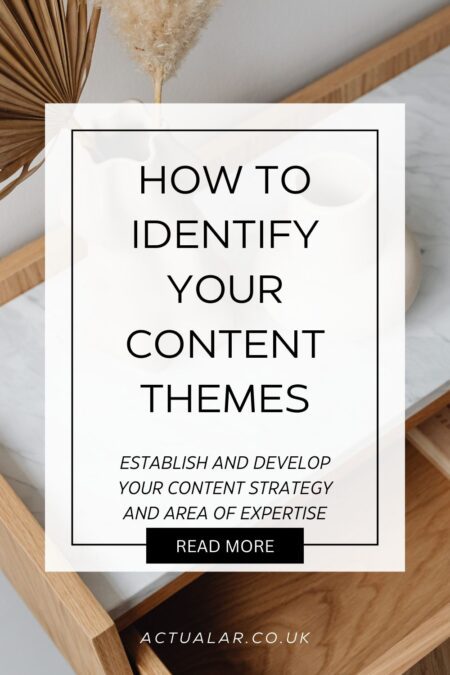It’s fairly easy to start a blog these days. There’s a wealth of information out there on getting started with blogging and how to set up your portfolio. But one thing that isn’t often explored enough is that of your content themes. In this post, we’ll explore what content themes are, why you need to identify them and how you can incorporate them into your freelancer’s roadmap.
This post should be helpful for anyone who’s ever wondered how they can blog about multiple topics, without getting trapped into the idea of having a niche. The best way to do that, in my opinion, is to identify a set of content themes early on.
Your content themes are really important. If you’re serious about being a writer or blogger, you need to make sure you set and adhere to them. Don’t get me wrong, it’s fine if you just want to write anything and everything that comes to mind.
The whole blogging world was built upon the foundations of this idea. Blogs were streams of consciousness for the most part, especially in their earliest iterations.
But times have changed. Blogging has become an industry in its own right. Content marketing as it’s now known, is a legitimate field in which you can earn a living if you can do it well. It’s more accessible than ever to make your dream of becoming a professional writer a reality. However, without a set of content themes, you’ll soon find that it becomes increasingly difficult to establish your online (and offline) presence.
Let’s jump in and explore the idea of identifying the content themes for your blog.
What are content themes?
Simply put, your content themes are the overarching topics that you consistently enjoy writing about. You may have one, you may have six, it doesn’t matter. Your content themes are vital to your identity as a writer. Without your content themes being set in place in your mind as well as within your body of work, your writer’s identity can become vague.
Your content themes are also crucial to the establishment of your blog’s authority. They also allow you greater freedom. I know a lot of others will say that to run a successful blog you need to ‘niche down’. I don’t fully agree with that. I think that what makes us good writers is what makes us fundamentally interesting as people, and that is the varied aspects of our personalities.
A human being is not a niche concept. We all have varied strengths, weaknesses, hobbies and interests, and for me, that’s what makes our writing worth reading. Having a set of content themes will allow you the flexibility to write around a range of ideas, rather than limiting you to one particular niche.

How to identify your content themes
Identifying the themes for your content is the next step. It doesn’t matter if you’re brand new or an already established blogger, you can still do this to help improve your work.
One of the simplest ways to do this is on paper. Write your blog’s name at the top of the page, and then underneath it draw maybe five or six branches stemming downwards.
You’re going to use each branch as one content theme. These will be the umbrella topics that you like to or want to write about most often. Consider these themes carefully; too broad and you’ll become vague, too narrow and you’ll start to run into niche territory. If you’re totally in the dark, you can use these questions to help you identify your content themes:
- What is your favourite topic to write about?
- What topic do you have a lot of knowledge or experience in? Can you apply this to your writing?
- How have you organised your Pinterest boards? (More on this in a minute)
- What do your readers want from you?
- What’s important to you?
- What idea do you never get bored of learning about?
Some of these questions can help you to narrow down your content themes. Draw them out on paper a few times to see what the most natural-feeling fit is for you. With these pillar themes in mind at all times, you’ll be able to categorise and flesh out your writing more thoroughly in future.
Why does having content themes even matter?
There’s a point to all this. It might seem easier to just write whatever is on your mind, and as I said above, that’s fine too. However, with a set of content themes, you’ll be able to allocate your written efforts more effectively.
For example, I had no idea that when I started writing about my curly hair journey it would become the most popular content on my website. Once I recognised this, I was able to turn my interest in the curly girl method into one of the content themes of my blog. Before this, I was blogging somewhat aimlessly, covering a vague and varied mixture of topics without any real strategy.
Identifying my content themes has helped me prioritise my writing. I’ve been able to distil my ideas into relevant sections of my blog. This helps to give me an overview of where I need to add more content and where I need to slow down. I tend to write furiously around one particular topic for a few weeks and then look at where I’ve left gaps. With a proper plan for my content themes, I’m able to achieve a better sense of balance.

Plot your content accordingly; the context mix
Once you’ve identified your content themes, you need to drill down a bit deeper. If you already have a website, you can look from the top down at all of your content and allocate it to each of your new theme areas. This should help you to spot where you’ve got gaps in your current content.
If you’re new to blogging, this gives you a great fresh slate to work with. Use your diagram to help you plot pieces of content for each content theme you’ve decided upon. The most important thing to remember when you’re working on this part of your blog planning is the context mix. Keep your content three-dimensional, interesting and contextual.
Keeping your content contextual is key to its longevity. What I mean by that, is to make sure the pieces you’re writing will be both current and relevant, but can also stand the test of time.
Look at your themes and work out where you can write at least five or six cornerstone posts that will always be useful to your readers.
How do themes differ from having a niche?
As mentioned earlier, there’s a lot of debate about having a niche as a blogger. I don’t think having a niche is that great for a writer’s creativity, but that’s not to say it isn’t sometimes useful. Many popular and successful blogs are successful purely because they stick to one content theme. It might be a money blog, a fashion blog or a parenting blog, but niche-specific blogs do work.
However, there’s a balance between success and satisfaction. I believe that it’s possible to have both, with a bit of planning. Having content themes allows you to assert yourself as an authority on a range of topics. As long as you don’t make that range too broad, then you should be fine.
It’s important, as a writer, to be able to explore your creative ideas as well as writing to generate an income. By establishing themes for your content, you should be able to do just that.
What if I want to change these themes in the future?
There’s no reason why you can’t adapt or change your content themes as time goes by. I didn’t start off writing about curly hair, it’s a content theme that has emerged over time. It might change in the future, who knows?
The same thing will probably happen with your blog. If you want to change your themes, just repeat the initial exercise and reallocate your ideas.
The only thing to consider here is your SEO. If you’ve spent a lot of time on your previous structures, decide whether or not to add a new theme or to reorganise the existing ones. Make sure you do any redirections that need doing if you do go for the reorganisation option.
You can use Pinterest to help you identify new or emerging themes. Your boards are a visual representation of your interests; let them guide you! They’re also helpful for finding out what people come to you to read about. Identifying your audience’s needs and interests can play a crucial role in helping you work out any new content themes going forward.
Let me know your thoughts on the idea of having content themes in the comments. You can also check out my Freelancing Tips board over on Pinterest for more ideas on getting the right content mix.
Content themes FAQ
Content themes are the key, overarching topics and ideas that identify you as a blogger. You need to work out what makes you tick as a writer, what you’re able to share with your audience and what you can become an authority on. Identifying your content themes is crucial to help your blog stay three-dimensional.
Your content themes will allow you to allocate your writing more effectively. They will provide your blog (and you) with the structure it needs to become engaging, varied and interesting. You’ll be able to see where your expertise is most valuable and you’ll be able to prioritise your work more appropriately. You’ll become a more interesting writer!
No. Identifying your content themes will help you avoid becoming stuck in a niche. By working out the topics that you enjoy writing about, you can make sure you have the flexibility to cover both niche and broader ideas. This creative freedom will stop you from feeling trapped as a blogger in the long term.
Of course! The beauty of having a set of content themes is that you have flexibility. As a freelancer, you need to be able to plan ahead and adapt to what your readers want from you. Evaluate your content themes as you go and adjust your themes to fit with these emerging trends.





This is something I’ve found quite tricky. I agree with what you say, like how “content themes are vital to your identity as a writer”, but with blogs rather than the standard website of the old days (at least that’s how it seems to be now, where content is constantly updated and fresh!) it can be hard staying within a ‘niche’. You need the niche, but you also probably need to break out of it too otherwise you start to feel boxed in and restricted. You make a good point separating themes from when some bloggers say you have to ‘niche down’. I’m thinking of rebranding a little so I’ve been thinking about this already this week – did you read my mind?!
Haha I think I might’ve done! It’s a tricky balance but I’ve found it’s really helped me to broaden my content themes just enough so that I can include all the strands of my interests without it all getting too waffly. At least I hope not, anyway! x
Interesting article.
I see lots of people starting blogs and then annoyed that they don’t make millions the next week. I give all people starting out the same advice, Write about what you enjoy writing about. If you aren’t enjoying it then you wont write it.
You’ll eventually find what you enjoy writing and then, off the back of that, what your readers find most engaging.
I write about what i’m interested in – and some of it is interesting to other people and some has ZERO page views and I’m reminded of this quote from the simpsons.
https://www.youtube.com/watch?v=HMqZ2PPOLik
😀
Thanks,
The Reverend